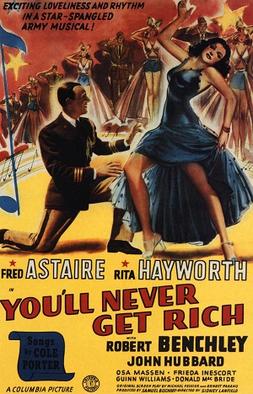Plot
In a New York theater, womanizing owner Martin Cortland tries to woo dancer Sheila by giving her a diamond bracelet, hoping for a romantic payoff. He enlists his choreographer, Robert Curtis, to help win her over. Robert, usually aloof, is unexpectedly impressed by Sheila's talent and personality—something even dancer Margo finds surprising.
Martin's plans unravel when his wife, Julia, discovers the bracelet—meant for Sheila—while searching for her own anniversary gift. Caught off guard, Martin claims the bracelet was from Robert to Sheila. Julia, unimpressed, slyly tells a paparazzo that Robert and Sheila are engaged, prompting gossip columns to run with the false story.
Robert, furious, confronts Sheila, who is just as confused. Sheila's would-be fiancé, Army Captain Tom Barton, visits her apartment during the argument. Posing as Sheila's brother, he threatens Robert with an unloaded gun before storming off, leaving Sheila and her Aunt Louise laughing at the prank.
Fearing for his safety and disillusioned with Martin, Robert enlists in the Army. At training camp, he befriends fellow recruits Swivel Tongue and Kewpie Blain. Sheila sends back the bracelet with a kind letter, and Robert realizes her sincerity and depth.
Sheila later visits the camp with her aunt to see Tom and his mother. While there, she hears music from the guardhouse and discovers Robert tap dancing with a group of soldiers. When they talk, he pretends to be an officer; Sheila sees through the lie but plays along. Trying to impress her again, Robert steals a captain's uniform and visits her at Tom's mother's house—unaware of whose house it is.
Tom and two fellow captains arrive for lunch. Recognizing Robert, they pretend not to know him and play along with his fake identity as a Washington inspector. Tom asks how to punish someone who stole an officer's uniform. Realizing he is caught, Robert awkwardly suggests guardhouse duty and leaves with Sheila, who is amused.
Martin arrives at the camp to stage a morale-boosting show. Robert agrees to assist only if Sheila is cast as the lead dancer, though Martin has promised the role to another dancer, Sonya. After rehearsals, Martin agrees Sheila is better suited. Their shared performance rekindles Robert and Sheila's chemistry.
Tom tells Sheila he is being transferred to Panama and proposes marriage. Their families expect the match, but Sheila hesitates, later telling her aunt she still loves Robert and believes he will propose.
Robert invites Sheila to his apartment, but Sonya is there. A misunderstanding over a mislabeled bracelet leads to a blow-up, and Sheila refuses to perform. After a troop protest, she agrees to return. Robert then arranges for a real priest to marry them during the show's wedding finale.
After the curtain falls, Robert reveals to Sheila—and the audience—that the wedding was legally binding. Martin later admits to Sheila that the bracelet scheme was entirely his doing. Relieved, Sheila embraces her new husband. Tom graciously arranges for Robert's release so he can begin his honeymoon, just as Swivel and Kewpie attempt a botched jailbreak, unaware Robert is already gone.

